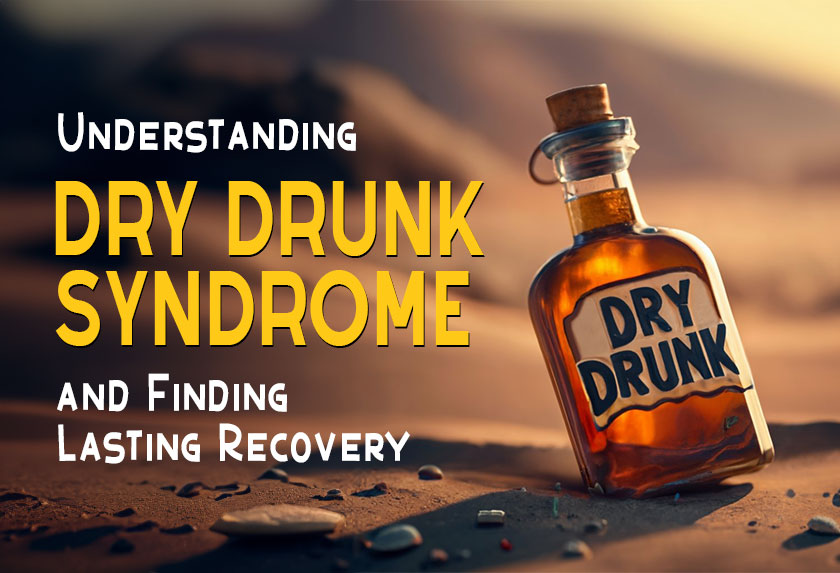Are you concerned about a friend or family member who is struggling with alcohol addiction? Have you noticed changes in their behavior even though they’ve stopped drinking? In this article, we’ll shed light on “Dry Drunk Syndrome” and guide you towards long-term treatment solutions for individuals dealing with alcohol addiction.
The Prevalence of Alcohol Abuse
According to the CDC one is six adults in the US binge drink, and this statistic doesn’t even account for underage drinkers or those who don’t acknowledge their addiction. What can be perplexing is the transformation in people’s demeanor when they cease drinking; they might become aggressive, irritable, or emotionally distant.
What is Dry Drunk Syndrome?
The term “Dry Drunk” refers to a person who has quit drinking but continues to exhibit the typical behaviors associated with alcoholism: unreliability, impatience, anger, and isolation. Dry Drunk Syndrome is a psychological and emotional condition that results from years of alcohol addiction.
Emotions like anger and sadness often stem from the realization of the personal and financial losses incurred during their addiction journey. To someone who has never struggled with addiction, giving up alcohol might seem trivial. However, for your loved one, it could have been their primary leisure activity and social outlet.
Recovering individuals may harbor regrets about missed job opportunities or unfulfilled dreams due to alcoholism, which can drain thousands of dollars annually, especially if consumed in bars.
Recognizing Symptoms of a Dry Alcoholic Personality
Psychologically, a dry alcoholic can be fragile. While therapy is recommended, not everyone is open to it.
Additionally, those who have completed alcohol detox might experience physical exhaustion, including symptoms like:
- vomiting
- sweating
- hallucinations
- seizures
If your loved one seems irritable following detox, it’s important to understand that they’re likely physically drained.
The challenge with Dry Drunk Syndrome is that it can persist for months or years after detoxification. Until addicts address their emotional and psychological issues, their destructive behavior may persist.
How to Support a Dry Drunk
Dealing with a dry drunk requires patience and empathy, especially if you haven’t experienced addiction yourself. Encourage your loved one to seek therapy or treatment. AA meetings can also provide a supportive community where individuals share their recovery stories, relapses, and healing journeys.
Your loved one doesn’t have to speak during meetings if they’re not comfortable; sometimes, just being surrounded by understanding peers can make a significant difference. They may also find mentors, individuals with years of sobriety who offer a listening ear and guidance.
Identifying Alcohol Addiction
If you suspect that your friend or family member is still using alcohol, watch for signs like joking about their drinking but reacting defensively to serious conversations. They don’t necessarily have to drink for hours on end, but they might consume alcohol daily.
A high tolerance for alcohol, developed over years of addiction, is another indicator. Surprisingly, even some underage drinkers can display considerable alcohol tolerance.
For men, consuming more than five drinks at once might indicate hidden alcoholism, while for women, more than four drinks at a time or eight drinks weekly could suggest an addiction.
If blackouts occur after several drinks or if work absenteeism and overspending at bars are common, these are further signs of an alcohol problem.
The Likelihood of Relapse
Studies show that around half of individuals with alcohol addiction experience a relapse within the first year of sobriety. This statistic emphasizes the importance of establishing robust support systems.
When speaking with friends or loved ones battling addiction, focus on their goals and celebrate the positive steps they’ve taken to improve their lives. Keep in mind that relapses can happen, but with determination, they can go through the detox process again.
Recovering From Dry Drunk Syndrome
Paradoxically, Dry Drunk Syndrome marks a positive step towards healing. Quitting alcohol means confronting life without its protective shield. It necessitates a complete lifestyle transformation, including making new friends and envisioning a brighter future.
If you or a loved one requires treatment for alcohol addiction, it’s time to seek a detox center that can provide the necessary support.
FAQs
Why can’t I stop drinking once I start?
Alcohol affects different people differently. For some, the urge to continue drinking after starting can be due to both physical and psychological factors, including tolerance and addiction.
Does the big book talk about dry drunk?
Yes, the “Big Book” of Alcoholics Anonymous (AA) discusses the concept of a “dry drunk” and provides insights into the challenges faced by individuals in recovery who may still exhibit alcoholic behaviors.
Why do I suddenly get drunk so quickly?
Several factors can affect how quickly alcohol affects you, including your tolerance, body weight, and what you’ve eaten. Drinking on an empty stomach or with a lower tolerance can lead to quicker intoxication.














